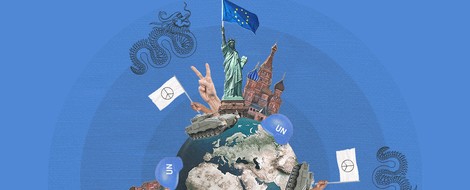Your podcast discovery platform
Curious minds select the most fascinating podcasts from around the world. Discover hand-piqd audio recommendations on your favorite topics.

piqer for: Boom and bust Globalization and politics Global finds
Associate Professor of Economics at George Mason University and currently a National Fellow at the Hoover Institution, Stanford. Educated at Oxford, Mark's main interests lie in economic history and comparative development. He is currently writing a book (with Noel Johnson) on the origins of religious freedom in western Europe. He has also published papers on state formation in Europe and China, weather shocks and pogroms in the middle ages, and private policing in 19th century England. More details about his research can be found on his webpage. He also blogs at Medium and Notes on Liberty.
Podcast: Remembering Mao's Famine
In this podcast interview with Russ Roberts, historian Frank Dikötter examines the devastating famine that accompanied Mao's Great Leap Forward.
Dikötter estimates that as many as 45 million people died as a result of the famine between 1958-1962. But, as Roberts emphasizes, even if the death toll was as low as 12 or 18 million (the most conservative estimates), this is still a shocking number. Given the scale of the suffering, it is striking that the famine barely registers for most people in the United States or Europe.Dikötter discusses how Mao's ambitions for economic "take-off", his rivalry with the Soviet Union, and his aim of overtaking British steel-production, set in motion a series of disastrous policies that would lead to tens of millions of people starving to death.
The gist of the story is that rapid industrialization required foreign currency and imported machinery. To pay for these, Mao had to export foodstuffs to world markets. He believed that this could be achieved by increasing quotas on farmers. To meet Mao's demands, lower level party cadres made extravagant promises about how much could be squeezed from the countryside. Private property was abolished. Farmers were forced into collective farms, where the only food available was from the village canteen.
The results were disastrous. And, when the overly ambitious quotas could not be met, the Communist Party responded with violence. Those who couldn't make the quotas were not permitted to eat. As in other Communist famines, the failure to meet impossible quota targets was interpreted in terms of peasant recalcitrance.
In a particularly tragicomic episode, the Communist Party ordered all sparrows to be killed because they were seen as pests who ate grain. The unintended consequence was a plague of locusts.
Dikötter concludes by discussing how difficult it remains to commemorate victims of the famine in today's China. A lot more background information is available at this link.
